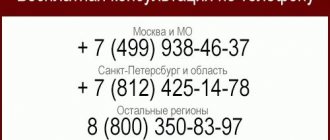Author of the article: Lina Smirnova Last modified: January 2020 4488
The Labor Code of the Russian Federation contains grounds on which an employer can terminate an employment relationship with an employee. The list of such reasons is defined in Article 81 of the Labor Code. However, for some violations, the employer has the right to dismiss the employee only by court decision, since they require criminal punishment. In this article, we will look at what violations are eligible for dismissal by court decision, what are the features of such dismissal, and what is the procedure itself.
Russian legislation
The Labor Code is recognized as the main regulator in the relationship between employees and employers.
It contains a set of rules to represent and protect each of the parties to such relationships. If we consider the issue of dismissal by court decision, then Article 81 of the Labor Code of the Russian Federation applies here.
It presents the main provisions that allow the organization to dismiss him without the consent of the worker. This norm is considered reference, since it works closely with articles of the Criminal Code. In another case, if the employee is not one, this will amount to a violation on the part of the company.
In the opposite situation, by a court decision, the employee will be able to be reinstated to the position from which he was previously dismissed. Additionally, he will be paid compensation related to lost profits and costs of legal proceedings.
There are no other norms that regulate this situation in the legislation. Such a measure is established only with illegal acts and possible criminal prosecutions against the worker.
Grounds for dismissal through court
It is the Criminal Code that contains a list of norms relating to the commission of illegal acts. Grounds for dismissal through the court will be valid if the employee has committed acts falling under the following articles of the Criminal Code:
- 47 – prohibition on carrying out certain types of activities by court
53 – restriction of freedom of movement- 54 – arrest of an employee suspected of an offense
- 56 – imprisonment for a period established by the court
- 57 – imprisonment for 20 years, the term is equivalent to life
- 160 – theft of other people’s property or embezzlement of funds
As for Article 53 of the Criminal Code, there is an amendment in force. Restriction of freedom of movement means that a citizen will be able to safely move only within the territory of the subject. If he needs to constantly travel on business trips for work, then, according to the court decision, he will be fired, since he will not be able to perform his main job function.
How to make calculations when dismissing an employee sentenced to punishment by a court verdict
When dismissing an employee sentenced to punishment by a court verdict, pay him wages, compensation for unused vacation, and other amounts due (part 4 of article 84.1, part 1 of article 127, part 1 of article 140 of the Labor Code of the Russian Federation).
As a rule, settlement with the employee must be made on the day of dismissal, and if he did not work on that day - no later than the next day after the dismissed request for settlement (Part 4 of Article 84.1, Part 1 of Article 140 of the Labor Code of the Russian Federation).
Difficulties in making such payments may arise, for example, when an employee is sentenced to imprisonment. In this case, you can, for example, transfer the amounts due to the convicted person to a notary deposit, guided by paragraphs. 1 clause 1 art. 327 Civil Code of the Russian Federation.
When you cannot dismiss by court decision
There are also reverse effects of the norm. In the event that a criminal case has been initiated against a company employee, but he does not have actual restrictions on his freedom and is under a written undertaking not to leave the place, the person can continue his activities. As long as there is no court decision on the case initiated on the basis of violation of criminal law, the employer, even as part of the commission, will not be able to dismiss such an employee.
Another case involves the fact that an employee can restore his rights based on a later acquittal. After the court decision comes into force, the employer can dismiss the employee within the prescribed period. However, there is no need to rush into this matter.
If the employee’s defense representatives are able to appeal the verdict, then the possibility arises in further consideration of the case on the merits that the punishment can be changed or completely removed.
What is the last day of work according to the court decision upon dismissal?
Until the court makes a decision or sentence by which it finds the employee guilty of committing a criminal act, the citizen is considered innocent. This is how the presumption of innocence works. Therefore, it is not legal to dismiss him before the court decision comes into force. The same provision applies if the employee decides to file an appeal against the verdict. He must do this within 10 days from the date of the court decision. And for the entire period until the appellate court considers the employee’s complaint, he is not considered guilty. Therefore, he cannot be fired.
There are several types of punishments that do not exclude the further work of the employee in respect of whom the court decision has entered into legal force. These are punishments such as:
- Art. 46 of the Criminal Code of the Russian Federation - a fine in a certain amount;
- Art. 49 of the Criminal Code of the Russian Federation - compulsory work, because they are performed in free time from the main activity;
- Art. 48 of the Criminal Code of the Russian Federation - deprivation of a class rank, special title or awards.
These punishments do not in any way affect the further work activity of the convicted employee, therefore it is impossible to dismiss him on the basis of a court decision that has already entered into legal force.
Dismiss the guilty employee on the basis of “conviction of the employee to punishment that precludes the continuation of his previous work, in accordance with the court verdict that has entered into legal force, clause 4, part 1, art. 83 of the Labor Code of the Russian Federation,” is possible only from the moment when the court decision (sentence) comes into force.
For clarity, it is worth giving an example: “A criminal case was opened against employee N. for robbery. Employee N. continued to work, since arrest was not ordered against him as a preliminary punishment. On October 5, 2016, a court hearing was held at which a verdict was made against citizen N. - guilty. He decided to file an appeal, and on October 8 his lawyer sent it to a higher court. The meeting was scheduled for October 18 of the same year. The appellate court upheld the court's verdict – guilty. Since such a decision was made on October 18, 2016, it will come into force only after 10 days – that is, on October 28, 2016.” It is on this day that the employee is found guilty, and this day is considered his last working day. It is this date that the dismissal order must be issued, and it is this date that will be indicated in the work book.
Determining the date of dismissal
Calculation of deadlines for signing orders and the rest of the paper work falls entirely on the shoulders of the employer. An employee cannot be dismissed until the event specified in paragraph 4 of Article 83 of the Labor Code occurs, namely, the court verdict enters into legal force. While the case is being investigated and records are being processed, the company cannot exclude the accused.
Another important nuance is that a court decision after it has entered into legal force is not the basis for issuing a dismissal order on the same day. Legislation represents the interests of each party. Therefore, after the decision is made, the accused employee has 10 days to appeal it. Only after this can the employer issue the necessary order to remove such employee from his staff.
Video about dismissal for absenteeism:
https://youtu.be/BiAoG4eG7M4
Reinstatement at work
If an employee does not agree with the decision made and considers it unreasonable, he has the right to protest his dismissal by filing a claim with the judicial authorities. This can be done no later than one month from the day on which a copy of the dismissal order was received.
If during the trial the employee was able to prove his innocence and the unfoundedness of his suspension from work, after receiving a court decision he must be reinstated in his previous job.
If the court decides that a person is innocent, the enterprise administration must issue a new order, according to which the employee is re-enlisted in his previous position. Execution of a court decision must be immediate, without waiting for it to enter into legal force. At the same time, the book reflects the date not of the court decision, but of the issuance of the order for reinstatement to the previous job.
If an employer for some reason delays hiring an employee, the latter has the right to appeal this in the courts. In this case, the judge makes a decision that the employee be paid the average salary for the entire period of delay.
An employer can sign a settlement agreement with an employee. In this case, you won’t have to wait for a court decision; you can immediately hire the person. However, the settlement must be confirmed by a court order.
If another person has already been hired in place of the dismissed employee, the management of the enterprise has the right to dismiss him for reasons that do not depend on the will of both parties.
Step-by-step instructions for dismissal
Now it is necessary to understand how dismissal is carried out step by step while respecting the legal rights and interests of each party.
The employer and HR department will need to do the following:
- Wait for a copy of the legal court decision that has entered into force regarding the indictment.
Wait 10 days from the date of the decision, during which the person can appeal it.- Issue a dismissal order.
- Next, all information should be transferred to the personnel department and accounting department, where they must fill out the necessary provisions in the work book.
- Make a copy of the employee’s work book and add it to the archive.
- Issue an order and documents to the employee.
- Print and issue salary certificates for the last two years.
It is worth noting that the days while the person was under investigation are not counted as work days. The final payment is calculated based on the days actually worked.
How to fire a convicted employee: detailed instructions
The general procedure for dismissal due to a court verdict for an employer is as follows:
- First, he must receive a copy of the verdict that has entered into legal force, because it is the basis for termination of the employment contract, and its details must be indicated in the Dismissal Order.
- The second step is to issue a dismissal order. It indicates the date of completion, number, name of the organization, description of the reason for termination of the employment contract, and the position of the originator. At the bottom is his signature and signature of the dismissed employee.
- On the day of dismissal, fill out the work book and make final payments to the employee for time worked and unused vacations. The days when he was absent from work due to being under investigation are not taken into account.
- After registering the work book, it is necessary to make a copy of it for the archive of the enterprise, and also make a note of dismissal in the employee’s personal card.
- On the day of dismissal, provide the employee with all salary certificates for the last 2 years, as well as a work book.
- If an employee has been convicted of failure to pay alimony or taxes, then you need to inform the bailiff about his dismissal by sending him a registered letter and attaching to it a document on the basis of which deductions from wages were previously made.
- If the employee is subject to military registration, then within two weeks the manager is obliged to submit information about the dismissal to the military registration and enlistment office.
Order of dismissal
The document consists of several parts. At the top of the order you must indicate the full name of the organization, as well as all its details. Do not forget that when drawing up this paper, you need to assign a number to it and add a copy to the archive. Any of the employee dismissal document forms available in this company will be suitable for filling out.
In the operative part, it is necessary to indicate the basis, referring to Article 81 of the Labor Code, as well as to the court decision, which has its own number. It lists all the reasons that make it possible for the manager to take these actions.
Below the operative part, the full details of the person, his position and residential address are indicated. Only after signing and, if necessary, affixing the organization’s seal, this document is sent to the accounting department and the personnel department for further actions on dismissal.
Recording in labor
HR department employees who have received a copy of the dismissal order from management must fill out the person’s work book in accordance with the specified requirements, indicating the grounds for dismissal, as well as the order number.
Further, the same information is entered into the person’s personal file, which is stored in the company’s archives. A copy of the work book is also attached here. Registration actions are necessary so that in the future, at the request of the person, there is an opportunity to be reinstated from a previously removed position.
Step-by-step actions of the employer
After receiving a copy of the court decision and determining the need to terminate the contract, the enterprise must take a number of final steps.
| Action | Description |
| Issuance of a dismissal order | The creation of an order is carried out after the legal validity of the decision. The order contains a reference to the decision |
| Filling out a work book | The entry is made on the last day of employment, determined by the manager. To fulfill any future requests, you will need to make a photocopy of the document. |
| Carrying out settlements with employees | Standard payments upon dismissal are made - the amount of accrued and unpaid wages, compensation for unused vacation. Funds are transferred to the person’s card or given to a representative by proxy |
| Making an entry in your personal card | The document contains information about dismissal |
An employee of an enterprise has the right to receive from the employer certified copies of documents related to work at the enterprise. Documents are issued within 3 days upon a person’s written request (Article 62 of the Labor Code of the Russian Federation). The list of available information includes information about length of service, salary, calculated and paid insurance premiums, copies of orders for the period of work.
Transfer of work record book and accrued salary
Based on the court decision and order, the accounting department must make the actual calculation of the dismissed employee. First of all, the days worked are subject to payment from the moment of the last payment of wages until the moment the employee is detained by law enforcement agencies.
The calculation is also made based on days of compensatory leave and vacations that were not taken by the citizen.
A frequent question among accountants is whether it is worth calculating the days when the employee was under investigation and did not perform his job functions. The answer is simple - such days are not subject to calculation.
After calculating the actual wages, the employee is invited by the employer or his authorized representatives are called to hand over all the documents, namely the work book, certificates, statements of calculations for two full years, as well as accrued wages. Everything can be received by relatives upon a notarized application of the person, or by the employee himself within a specified time before leaving for the place of imprisonment.
Notification of authorities about dismissal
The employer is obliged to independently notify the state authorities to which his employee is involved that he was dismissed on the basis of an order and a previously issued court decision in a criminal case.
If a citizen during the period of work had restrictions imposed by bailiffs, on the basis of existing arrears in payments or alimony, then after dismissal the company is obliged to notify the FSSP about this action.
Another basis for notification is if a male employee and under 27 years of age was registered with the military registration and enlistment office. After his official dismissal, the personnel department must send a corresponding letter to the military commissariat at the citizen’s place of registration notifying him that he has been dismissed from his position.
Important Limitations
Labor legislation also protects the interests of the employee under investigation. Summarizing the above requirements for each of the parties, it can be noted that the main restrictions on the right of dismissal are the following:
The case is being considered on its merits and a court decision has not yet been made- The sentence may include a fine
- The employee is charged with corrective labor
Paragraph 4 of Article 83 of the Labor Code clearly states the grounds that make it possible to dismiss an employee by court decision. It consists in the inability to carry out further work activities. This basis arises only if the court imposed a sentence of imprisonment for a specified period. If the punishment does not have such sanctions, the employer does not have the right to dismiss the employee.
What types of penalties are grounds for dismissal?
The appearance of a court verdict against one of the employees does not always mean that the employer must fire him. The main feature is the indispensable presence of the fact that a person cannot fulfill his duties. This in turn occurs when the following types of punishment are imposed:
- the arrest of an employee implies his isolation from the outside world, in which case the fixed-term employment contract is terminated if its duration does not exceed the period of arrest;
- imprisonment (and the term is not important - the fact itself is already grounds for dismissal);
- life sentence;
- punishment in the form of a ban on holding a certain position (usually the civil service or managerial positions in self-government bodies) or engaging in any activity.
In the latter case, the dismissal of an employee is not an option, but an obligation of the employer. The manager, having received a sentence, must act in the following order:
- within a maximum of 3 days after receiving a copy of the verdict, terminate the employment contract with the convicted person or impose a ban on conducting any specific activities in relation to him and transfer information about the fulfillment of obligations to a higher authority;
- in case of receiving requests from the inspection, provide supporting evidence demonstrating timely compliance with the requirements;
- if amendments and changes are made to the contract or the employment relationship is terminated in principle, this must also be reported to the inspectorate;
- make entries in the work book (it is necessary to indicate not only the basis and reference to a specific article of the Labor Code of the Russian Federation, but also the circumstances of the criminal case - how long he was sentenced to, what position he should not hold) - this is necessary so that the next employer is aware of what activities and until what period the position applicant has no right to engage in activities according to the law.
Other types of punishment do not lead to the dismissal of an employee. Of course, receiving information about a lawsuit against an employee may change the employer's opinion about him. However, he will not be able to use the punishment itself as an argument - he will have to be fired for other reasons.
Often employers are faced with a situation where their employees are sentenced to correctional labor on the basis of Art. 50 of the Criminal Code of the Russian Federation. This format of punishment involves carrying it out at the employee’s place of work. However, in this case, the employer has another obligation - to withhold income in percentage terms for the benefit of the state budget. Its final size is determined individually; the court verdict specifies the percentage of earnings (5 – 20%).
If the entry into force of the judgment is delayed
The issuance of a court decision may take more than one month. Here difficulties may arise in properly dismissing a person.
During the investigative actions, when the proceedings are ongoing and the defendant is in custody, the employer does not have the right to dismiss such an employee. For the entire period of his stay in the pre-trial detention center until the sentence comes into force, wages and work experience for these days are not calculated on the basis of Article 129 of the Labor Code of the Russian Federation.
The only possibility to dismiss an employee before a court decision is made is the presence of the grounds listed in paragraph 6 of part 1 of Article 81 of the Labor Code of the Russian Federation.
These include:
theft- embezzlement
- intentional destruction or damage to property
All these actions must be proven and carried out at the place where the employee performs his professional functions.
Article 81 of the Labor Code of the Russian Federation additionally specifies one more reason for dismissal before receiving a sentence. It is associated with a loss of trust due to doubts arising in the employee’s performance of his job duties.
For example, if a citizen works with securities or cash, and a criminal case has been initiated against him under Article 159 of the Criminal Code of the Russian Federation “Fraud,” he may be fired due to loss of trust.
To dismiss on this basis while the entry into force of the sentence is delayed, it is necessary to obtain confirmation from law enforcement agencies. Usually this is the confession of the accused in the case and the conclusion of experts from the Ministry of Internal Affairs, confirming the person’s involvement in the commission of the crime.
Video on how to challenge illegal dismissal:
Dismissal of a convicted employee - entry into the labor record, order, judicial practice - Center Pro
Dismissal of a convicted employee - real employers do not have to deal with this formulation very often, so they may not know how to correctly carry out the procedure for terminating an employment contract. It is important that the dismissal occurs in full compliance with the law, otherwise the employee may not only be reinstated in his position, but also receive financial compensation.
Grounds for dismissal of a convicted person
The Labor Code of the Russian Federation contains a complete list of grounds for dismissal of employees. Thus, Article 83 of the Labor Code of the Russian Federation provides for the possibility of termination of labor relations due to circumstances beyond the control of either party. These include the conviction of an employee (clause 4). However, it is applicable only if two conditions are met:
- The court verdict on the basis of which the employee was convicted entered into legal force. Any decision can be appealed to a higher authority. The time for filing an appeal is determined by Art. 390 Code of Criminal Procedure of the Russian Federation. Moreover, when filing a complaint, the entry into force may be delayed until the verdict is recognized as legal.
- The sentence imposed prevents the convict from further work. This does not necessarily have to be imprisonment for any period of time. A person may be prohibited from conducting a certain type of activity (for example, economic or related to material values).
There are known situations where a sentence against an employee was overturned. If the employer has already fired him and hired another person in his place, then according to the law the manager must:
- reinstate the former employee in his position, since there are no longer grounds for terminating the employment contract;
- dismiss the person hired, referring to clause 2, part 1, art. 83 Labor Code of the Russian Federation.
The procedure for personnel changes in this case is initiated by a former employee. He informs about the cancellation of the sentence, and then the employer acts.
Our lawyers know the answer to your question
If you want to know how to solve your specific problem
, then
ask
our duty lawyer online about this.
It's fast, convenient and free
!
or by phone:
- Moscow and region:
+7-499-350-82-48 - St. Petersburg and region:
+7-812-309-46-73
What types of penalties are grounds for dismissal?
The appearance of a court verdict against one of the employees does not always mean that the employer must fire him. The main feature is the indispensable presence of the fact that a person cannot fulfill his duties. This in turn occurs when the following types of punishment are imposed:
- the arrest of an employee implies his isolation from the outside world, in which case the fixed-term employment contract is terminated if its duration does not exceed the period of arrest;
- imprisonment (and the term is not important - the fact itself is already grounds for dismissal);
- life sentence;
- punishment in the form of a ban on holding a certain position (usually the civil service or managerial positions in self-government bodies) or engaging in any activity.
In the latter case, the dismissal of an employee is not an option, but an obligation of the employer. The manager, having received a sentence, must act in the following order:
- within a maximum of 3 days after receiving a copy of the verdict, terminate the employment contract with the convicted person or impose a ban on conducting any specific activities in relation to him and transfer information about the fulfillment of obligations to a higher authority;
- in case of receiving requests from the inspection, provide supporting evidence demonstrating timely compliance with the requirements;
- if amendments and changes are made to the contract or the employment relationship is terminated in principle, this must also be reported to the inspectorate;
- make entries in the work book (it is necessary to indicate not only the basis and reference to a specific article of the Labor Code of the Russian Federation, but also the circumstances of the criminal case - how long he was sentenced to, what position he should not hold) - this is necessary so that the next employer is aware of what activities and until what period the position applicant has no right to engage in activities according to the law.
Other types of punishment do not lead to the dismissal of an employee. Of course, receiving information about a lawsuit against an employee may change the employer's opinion about him. However, he will not be able to use the punishment itself as an argument - he will have to be fired for other reasons.
Often employers are faced with a situation where their employees are sentenced to correctional labor on the basis of Art. 50 of the Criminal Code of the Russian Federation. This format of punishment involves carrying it out at the employee’s place of work.
However, in this case, the employer has another obligation - to withhold income in percentage terms for the benefit of the state budget.
Its final size is determined individually; the court verdict specifies the percentage of earnings (5 – 20%).
Dismissal procedure
Finding themselves in a similar situation, most employers do not know how to fire a convicted employee if he has been imprisoned. But in case of violation of the law, it may turn out that the head of the enterprise himself may be punished. Therefore, it is important to carry out the procedure as described in the regulations. This needs to be done step by step.
Issuance of an order
The dismissal order is drawn up exclusively after receiving a court verdict. No special form of document is required - standard T-8 is used. The main difficulty for the employer is determining the last working day.
Here you need to start not from the moment of absence from work and not from the date of the verdict. Dismissal occurs only after it enters into legal force. That is, if a sentence was passed on September 10, it will come into force 10 days later - on September 20.
This day will be considered the day of dismissal of the employee.
Sample of filling out an order:
If the employee was in custody at the time of sentencing, then the 10-day count begins not from the moment the sentence was passed, but from the date when the convicted person received a copy of the court decision.
The effective date (and, accordingly, the day of dismissal) may be postponed if a party files an appeal. Then the dismissal process may be delayed. We will have to wait for confirmation of the verdict.
Familiarizing the employee with the order is one of the important steps. However, when the employee is in prison, this is not possible. In this case, the order must include a note indicating the impossibility of familiarization. When drawing up the order, a calculation note is also drawn up in form T-61. The corresponding entries are made in the personal T-2 card.
Making an entry in the work book
The work book is a strict reporting form. The employer is responsible for the correctness of the information entered into it. Therefore, recording a dismissal due to an employee’s imprisonment is important in accordance with the law. The work book must reflect:
- on what basis is the employment contract terminated (reference to the court verdict and a specific article of the Labor Code of the Russian Federation);
- date of entry and dismissal;
- link to the title document (date and number).
Employment registration:
The manager must sign the entry and put a stamp, if available (for legal entities, it is required).
In this case, it is impossible to hand over a work book. Therefore, the procedure begins with sending a written notification by mail of the need to pick up documents.
It is usually sent to your home address. If the letter remains unanswered, then the labor force remains to wait for its owner.
If the former employee asked to send the book by mail, then the employer sends it at his own expense.
Carrying out calculations
When dismissing an employee, the employer must pay him all amounts due. No compensation is due in this case. The payment consists of days worked, bonuses, and payment of vacation pay not taken off. They are calculated in the usual manner.
In the case of a cashless transfer, there should be no difficulties - the money is sent to the recipient’s previous account. If the organization provides only cash payments, then the convicted person will first have to present a demand to pay all the remaining money.
Moreover, it is not at all necessary to apply in person - you can draw up a power of attorney for another person, for example, a close relative.
The dismissal procedure itself is not particularly complicated. The main thing is to correctly determine the date of dismissal.
Source:
How to dismiss an employee sentenced to punishment by a court verdict
Upon dismissal based on a court decision, an employee is entitled to payments for time worked and compensation for days of unused vacation.
Those days when he was under investigation and absent from work are not taken into account, since this is not considered a valid reason.
When an employee resigns, regardless of the reason and basis for leaving, he is given his work book, in which the necessary entries are made:
- about hiring;
- about all internal movements;
- about dismissal.
The following entry will be made in the work book:
- in column 1 – the serial number of the entry;
- in column 2 – date of recording. In this case, this is the date of the court's decision or sentence;
- in column 3 - a record of dismissal is made, including the reason for termination of the employment relationship;
- in column 4 - details of the dismissal order. These include: the serial number of the document, the date of its publication.
This entry is made by an employee of the HR department, who confirms it with his signature. You also need to indicate the position of this employee and his full name. After all these entries, the employee puts his signature. This indicates that he is familiar with this record.
In what cases is it possible to dismiss an employee who has been sentenced to punishment by a court verdict?
You need to dismiss an employee who has been sentenced to punishment if the sentence has entered into legal force and the employee’s further continuation of work is impossible (for example, he is deprived of his liberty). We will explain further on what grounds for dismissal in this case.
In some cases, you can dismiss an employee who has been sentenced to punishment by a court verdict, even if the punishment does not preclude the possibility of him continuing to work (for example, if he is given a suspended sentence). We will talk about such cases below.
But you can choose another basis for dismissing an employee in the following cases:
- if he is punished for committing theft of someone else's property, embezzlement, intentional destruction or damage at his place of work, you can fire the employee under paragraphs. "g" clause 6, part 1, art. 81 Labor Code of the Russian Federation;
- If an employee directly servicing monetary (commodity) assets is punished for committing guilty actions that give rise to the loss of your trust in him, dismissal is possible under clause 7, part 1, art. 81 Labor Code of the Russian Federation.
In both the first case and the second (provided that the employee has committed guilty actions that give rise to loss of trust, at the place of work and in connection with the performance of job duties), you will have to follow the procedure for bringing the employee to disciplinary liability for failure to fulfill the employee’s official duties.
- if the employee is sentenced to punishment, in the presence of which the law restricts his right to engage in his previous work activity. For example, if a teacher is convicted of a crime against life and health, you can fire him under clause 13, part 1, art. 83 of the Labor Code of the Russian Federation - “the emergence of restrictions on engaging in certain types of labor activity established by the Labor Code of the Russian Federation, other federal law and excluding the possibility of an employee fulfilling obligations under an employment contract.”
This is due to the fact that such an employee does not have the right to engage in teaching activities if he has a criminal record for such a crime (paragraph 3, part 2, article 331, part 1, article 351.1 of the Labor Code of the Russian Federation).
But in this case, he will first have to offer a transfer to other suitable vacancies in accordance with Part 2 of Art. 83 Labor Code of the Russian Federation. Therefore, if the punishment is associated, for example, with imprisonment, it is better to dismiss the employee under clause.
Source: https://centrproh.ru/oformlenie/uvolnenie-osuzhdennogo-rabotnika-zapis-v-trudovoj-prikaz-sudebnaya-praktika.html
Dismissal for absenteeism by court decision
Absenteeism is a misdemeanor for failure to perform labor functions. Typically, such actions are regulated by the company's internal documents.
If an employee is 4 hours late or does not show up for his shift, this will be grounds for his dismissal by order of management. However, this cannot be done until the employee provides a written explanation of the reason for absence from work.
There are good reasons why an employee has the right to be absent. These include:
Blood donation- Attendance at approved rallies
- Illnesses, if a certificate of incapacity for work is issued
- Vacation
- Attending court as a juror
Grounds also include failure to fulfill obligations on the part of the employer. These include unsafe working conditions and failure to provide the necessary tools to carry out work activities.
The employee received a criminal record. What to do?
A convicted person is suspended from certain activities not only as punishment for an offense committed.
The second reason is the high probability of committing a similar crime in the future. Therefore, all requirements of the Criminal Code of the Russian Federation must be observed unconditionally.
As soon as the enterprise has received notice from the criminal enforcement authorities about the court decision, it must take the following actions:
- Immediately formalize the termination of the employment contract. The law provides a period of 3 days for completing formalities.
- Prepare documentary evidence of fulfillment of obligations.
- Send a notification to the penal authority regarding compliance with the requirements of the court sentence. If necessary, provide a copy of the dismissal order, an entry in your personal file and other supporting documentation.
- At the request of a person who has served his sentence or a released person, the enterprise provides a duplicate of the work book without recording the reason for termination of the contract.
Attention! Two points need to be taken into account:
- If a court decision is not made, the manager cannot consider the option of terminating the employment contract due to a disciplinary violation. Such an action is considered illegal, since the employee’s detention is a valid reason for absence from work.
- If an employee is sentenced to correctional labor, dismissal while serving the sentence is a violation of the Labor Code of the Russian Federation. You can terminate the employment relationship either by agreement of the parties or at your own request only with written permission from the criminal-executive inspection.
Is it possible to be fired for drunkenness? The answer is here.
How to appeal a court verdict
An appeal against a court verdict can be made only if the person does not consider himself a guilty party under the charge. In this case, complaints are sent to higher authorities, which subsequently consider the case on its merits. If, after the review, circumstances that were not previously identified become clear, the case is sent to the investigation for further development.
Further, the hearing and review of the case is scheduled for another date, for which each of the parties must prepare. As a result, if the opposite is proven and the person is found innocent, the previously passed sentence against him is completely lifted, and the citizen can be reinstated to work.
How to dismiss a person sentenced to correctional labor from work?
If an employee who works in the organization at the main place is sentenced to correctional labor and this does not allow him to perform his duties, he can be fired.
Another situation is also possible, when a convict entered the organization specifically to execute a sentence.
In this case, he cannot resign on his own initiative, and if the administration wants to get rid of such an employee, he will have to notify the criminal-executive inspection about this.
As a result, if an employee of an organization is convicted of a criminal offense, the employer has the right to fire him. If an administrative penalty is imposed on an employee that interferes with the performance of his direct duties, then dismissal is possible.
When performing the procedure, the employer will need to draw up an order and also make an entry in the work book. The calculation is assumed to be standard, including salary and all compensation due.
Mistakes when terminating a contract
Frequent mistakes when terminating an employment relationship are incorrect calculations by citizens or violation of deadlines established by the court.
First of all, this applies to the moment when an employer rushes to dismiss an employee immediately after a criminal case has been opened against him. He will not be able to do this for the reasons described above.
Another mistake is the violation of the deadlines for the entry into force of a court decision. If the dismissal was formalized within 10 days, and was subsequently appealed, and the citizen received an acquittal, the employer is obliged to correct the shortcomings and reinstate the employee.
All actions related to dismissal by court decision are clearly regulated by labor and criminal legislation. Without strict adherence to procedure, orders cannot be carried out or issued. If an employee finds a violation of these requirements, he can appeal the decision and order from the company also in court.
Top
Write your question in the form below
Legal nuances of termination of the contract
To terminate a contract by a court decision, the manager must wait until such a decision comes into force. When dismissing an employee due to an offense, the employer is obliged to act within the framework of current legislation. If the employer determines that an employee has committed theft or another illegal act at the workplace, it is necessary to call the police. They will inspect the scene of the incident, interview witnesses and draw up relevant documentation.
Violation of safety or labor protection rules may serve as grounds for dismissal by court verdict if it entails serious consequences. In this case, it is necessary to draw up a conclusion from the relevant commission. The document indicates that as a result of the actions of a specific employee, the organization or people's health was damaged. Without this act, it will be unlawful to dismiss an employee.
In this case, the employer must take into account the time allotted for appealing the verdict. The manager can issue a dismissal order no earlier than he receives a copy of the court decision.











